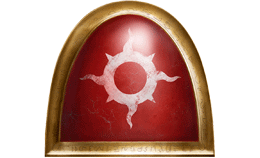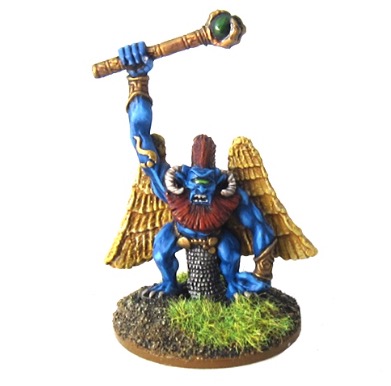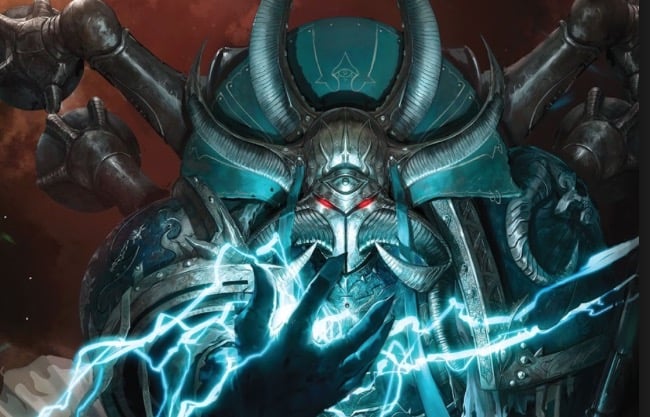40K: Why Is Ahriman So Bitter?



One Gamer digs to the bottom of Ahriman’s Bitterness…
Hunted by the Imperium of Man, both respected and feared by his Traitor Legionary brothers and exiled by his own father Primarch … what really makes Ahriman so bitter?
Ahzek Ahriman, once the Chief Librarian of the Thousands Sons space marine chapter, has a long and winding path into corruption. Like his fellow Thousand Sons, Ahriman was a loyal servant of the Emperor when the Horus Heresy began. But so, too, was he his father’s son. Ahriman, like all the Thousand Sons, had inherited three important geneseed traits from his Primarch Magnus the Red – a towering intellect laced with raw psychic power, a genetic abnormality that often resulted in spontaneous mutation (the ‘flesh-change’) and an arrogant belief in his own abilities. So, when Horus turned away from the Emperor, Ahriman had complete faith in his father’s decision to warn against the betrayal by any means. They were loyal, He would understand.
Sadly, for the Thousand Sons, the Emperor did not understand. He ordered Prospero, their home world, burned and all traces of their chapter purged from the galaxy. It is only at this juncture, that Magnus was able to throw off the shackles of his own hubris and to see that he had been manipulated from the start. The wily Serpent of the Great Ocean, Tzeentch itself, that he had trafficked with to forestall the ‘flesh-change’ and enhance his own powers, had prevailed after all.
Magnus had been manipulated at every turn, and though the warnings he had given to the Emperor had been rooted in the truth, they were but a weapon with which he had been tricked to strike at his own father. The Emperor’s great work, a Webway mastered by Mankind and not the Eldar, was gone, and he had destroyed it. Overwhelmed by this knowledge, Magnus, for the first and only time in his life, set aside his hubris and humbly submitted to his fate.
Unfortunately for the galaxy at large, Ahriman and the rest of the Thousand Sons were not so accepting of the destiny that the Architect of Fate seemed to lay before them. For Ahriman in particular, clarity brought no feelings of remorse. All he saw was treachery, ignorance and the betrayal of honest loyalty. Like his fellows in Magnus’ inner circle, Ahriman was appalled to learn that the Emperor had declared them traitors, and loosed the Space Wolves upon Prospero.
But worst of all, Ahriman was astonished to see his own father reduced to a feeble and broken spirit. Magnus asked his children to lay down their arms and join him in his acceptance of punishment; their fate. A pivotal moment in galactic history, Ahriman refused. If Magnus would not lead the resistance, Ahriman would do so himself.
“We are the Red Sorcerers of Prospero, damned in the eyes of our fellows, and this is to be how our story ends, in betrayal and bloodshed. No…you may find it nobler to suffer your fate, but I will take arms against it.”
— Chief Librarian Ahzek Ahriman speaking to Magnus the Red, Primarch of the Thousand Sons

Betrayed by the Emperor and fed to the Wolves.
Though Ahriman’s rallying of the Thousand Sons would prove futile, it did ultimately save what was left of the chapter from the ashes. Shamed by his own sons’ refusal to accept the fate that others had maneuvered them into, Magnus shook off his apathy and descended from his sanctuary to meet his brother Russ in personal combat. Though Russ would ultimately prevail, in defeat, Magnus accepted the Tzeentch’s latest snare and enacted the sorceries that transported the remaining Thousand Sons to the daemonworld, the Planet of Sorcerers, that awaited them in the Eye of Terror.
Separate Paths
Exile into the Eye of Terror was an eye-opening experience for Ahriman. Already disillusioned with his own Primarch as both a leader and a father, Ahriman now bore witness as Magnus fully succumbed to the wiles of Tzeentch. Gone was all pretense, and Magnus the Red, Master and Lord of the Thousand Sons, was ‘elevated’ to an all-knowing, all-powerful and uncaring, daemon prince of Tzeentch. Ahriman did not see this as a glorious ascendance, but rather a pitiful perversion of a man, no near demigod, he had once revered above all else.
Once a true and loyal servant to the Emperor of Mankind, Magnus had been reduced to a mere vassal to the very Great Serpent that had orchestrated his fall. Mutation began to run amok among Ahriman’s brothers in the ranks of the remaining Thousand sons, and horrifically, many treated these as gifts from their new patron god. But Ahriman would have none of it. Turning his back fully upon his geneseed father, Ahriman determined that none now would ever be his master again. He would walk his own path and bend destiny to his will. And he chose to begin this path with an attempt to save his remaining legion.
If Magnus did not care and would do nothing, then he would do so himself.
All-powerful vassal of Tzeentch.
Of course, the Rubric of Ahriman would prove to be a failure, at least in his own eyes. Halting the ‘flesh-change’ in his brothers had ultimately dammed most of them to an existence of living death, bound to their own armour forevermore. Those with truly mighty psychic talent, such as himself, had been spared, and even seemingly immunized from the curse. But the result was not what Ahriman had been lead to believe.
Additionally, Magnus had been at last roused from his tower to confront Ahriman and his cabal. Expecting destruction for his deeds, Ahriman determined to die as he intended upon Prospero, on his feet and defiant. Instead, he and his fellows were spared, though they were banished from the Planet of Sorcerers.
Facing exile once again, this time from his father and comrades both, Ahriman spent the next several centuries wandering the Eye of Terror and contemplating his failure. Eventually, when confronted by the most powerful of his brothers to have also been exiled for throwing in their lot with his cabal, Ahriman cast aside his last doubts. After destroying these last vestiges of his failure, Ahriman turned to amassing more and more power so that eventually, he would succeed.
Even more than his brothers, perhaps even more so than his father Magnus, Ahriman believed, indeed still believes, that he can do anything with the proper application of knowledge, and the will to make it so. It is at this time, through a long and twisting series of adventures, that Ahriman becomes the driven Chaos sorcerer feared throughout the galaxy and Webway beyond.
Ahriman’s entire background and the deeds leading to his present status are beyond the scope of this article, but a full accounting of these events can be found here.
Bitterness of the Long War
Heeding the call and assuming the mantle.
Given the events that drove the Thousands Sons to turn from the Light of the Emperor, Ahriman has many reasons to be bitter. The events leading to the Horus Heresy were a time rife with scheming, betrayal and hypocrisy for the Thousand Sons. What’s more, Magnus, a figure of unassailable reverence to his sons, was seemingly manipulated by all the key players of those times. Horus, Tzeentch, even the Emperor himself, all used Magnus as a pawn and plaything. For these things, and more besides, Ahriman has the right to be bitter with his lot. But, ultimately, it is none of these things that drives Ahriman’s obsession. In the end, the fuel that powers his bitterness in the Long War is his disappointment in his own father.
For Ahriman, it all comes down to that moment when Prospero is burning around them and frothing Wolves are raining from the skies. Despite all that has happened and the treacheries of seeming the entire galaxy, all can yet be set right. The Thousand Sons look to their revered father, the font of their knowledge and power, and there is still hope. But instead of strength and guidance, they find only weakness and resignation. Of all the indignities heaped upon the Thousand Sons in those times, this is the one that Ahriman finds he simply cannot abide. With his brothers stunned around him, Ahriman seizes the reins of power for himself, from the very fingers of a living Primarch. Ahriman does so not because he wants the mantle of power, but because he feels he must. His father has failed them; a Primarch has faltered. At that moment, Ahriman forges himself into a new man; the man untold trillions, and more, in the long millennia afterward would come to rue.
In the end, Ahriman’s bitterness makes him the monstrous villain he is in the 41st millennia. But at its core, it is the shame of his father’s weakness that lingers. Though he would never speak the words aloud, even to himself, at that moment when Magnus wavered, Ahriman felt that the mantle of Primarch of the Thousand Sons shifted to himself. And with this mantle, the burden of responsibility to all his remaining brothers became his as well. It is this feeling of responsibility that drove him to enact the Rubric of Ahriman, and has continued to drive his quest to amass the resources required to correct its failure.
The Bitterness of the Table-top
So having laid out the case for Ahriman’s valid reasons for bitterness in the current 40K setting, let’s get to the heart of the matter. Beyond 40K’s rich background, it is ultimately a wargame, and that’s really why we’re all here, right? Sadly, Ahriman has plenty of cause for bitterness here as well, and even more unfortunately, we as Chaos Space Marine players get to share in his pain.
At 230 points, Ahriman comes with a hefty price tag. And while being one of the very few beings in the entire game to be a level 4 psyker at first seems a potent boon, it often proves to be nothing but the empty lies of Tzeentch yet again. Burdened with the twin curses of being forced to roll at least one Tzeentch psychic power and the inability to control or reroll his psychic manifestations (such as with a spell familiar), Ahriman’s psychic powers are often stunted or event detrimental (he inevitably rolls a Perils of the Warp or two each battle). Sadly, the two level 3 sorcerers, Hathor Bubastis and Khabek Xalti-ptah, that I usually run in my Thousand Sons armies just flat out perform Ahriman in nearly every aspect. And they do it for a far cheaper point cost. And they still aren’t particularly good, since they too, are burdened with being forced to utilize psychic powers from the awful Tzeentch discipline.

.
10,000 years and still lookin’ fine…
Aside from his psychic power level, Ahriman in-game has little that distinguishes him from the typical chaos sorcerer found in the CSM codex. His stat line has modest improvement over the typical sorcerer, but nothing beyond a single point increase here and there. Additionally, his equipment is virtually the same as that found in hands of any aspiring sorcerer from in a Thousand Sons unit, with the only notable exception being the chaos artifact The Black Staff of Ahriman. Now, setting aside that the CSM codex is old (the oldest in use in the current edition), this artifact was never really particularly good.
Before the FAQ it allowed Ahriman to use up to three witchfires in a single Psychic phase (something all psykers can now do). With the current FAQ, it now allows Ahriman to use the same witchfire up to three times in a single Psychic phase – which while it seems could be good, I’ve never really been able to pull off with any success. Aside from that, the Black Staff is just your typical force staff.
So given his failings, what could be done to improve Ahriman’s table-top performance? Well, setting aside the fact that this probably cannot really be done until the CSM codex itself is fixed (everything is wildly overcosted when compared to any of the modern post-Necron codexes, the Mark of Tzeentch does virtually nothing worthwhile and even saddles its bearer with the terribad Tzeentch psychic discipline, etc.), Ahriman just costs too much. Compared to other powerful psykers in the game, such as Eldrad or Tigurius, Ahriman is meagre and impotent – and still more expensive.
If it were up to me, I’d grant Ahriman access to a wider variety of psychic disciplines, such as Divination (which was his original specialty), abolish the Tzeentch discipline entirely and replace it with the Change one found in the Fenris campaign update, and grant him some sort of special ability that allows him to better select his psychic powers for a given game (similar to Tigurius). Beyond that, I’d upgrade his Black Staff to also either function as a spell familiar or have some ability to siphon off Perils of the Warp similar to an Eldar Ghost Helm. Then drop 30 points right off the top.
Why do you think Ahriman is so bitter? Have I reasoned it out, or do you have other ideas? What sort of changes to Ahriman’s rules would you like to see to make him worth his cost?







